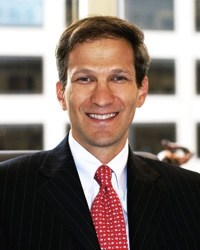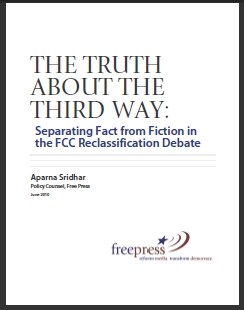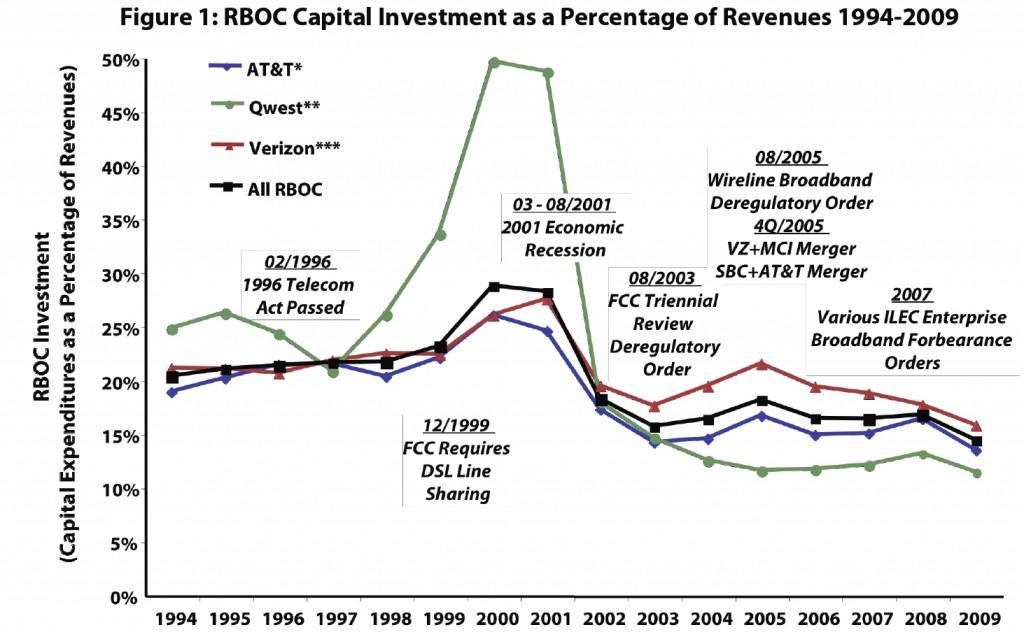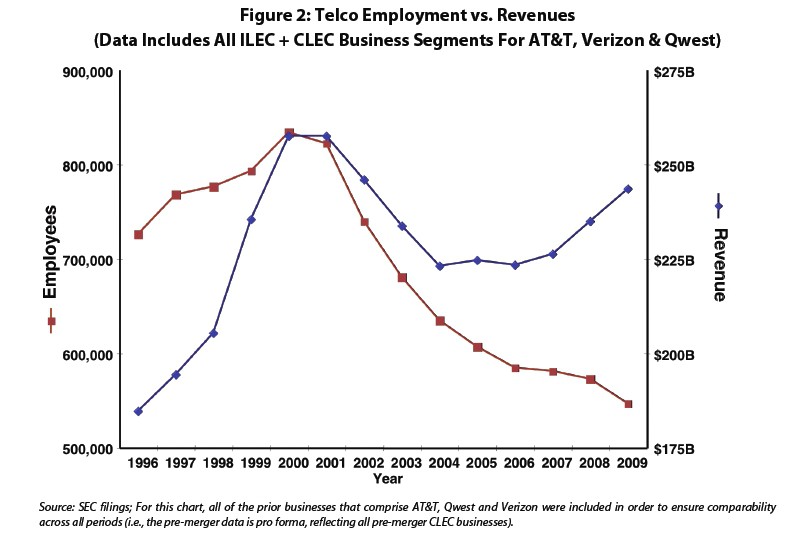
Shapiro
Yesterday, Stop the Cap! reviewed a report from Robert J. Shapiro and Kevin Hassett suggesting “heavy users” should pay 80 percent of the costs to upgrade and expand broadband service to help lower prices for Internet access among America’s poor. But what might have read to some as a scholarly assessment of challenges confronting American broadband is, in reality, propaganda produced by Sonecon, a Washington, D.C.-based lobbying firm hired by AT&T to sell their corporate agenda to the American public, interest groups, and Congress.
Beltway Economics – Buying Credentialed “Experts” to Back Discredited Policies
The dirty little secret of Washington power politics is that money buys attention, access, and all too often votes. What began as a cottage industry to help facilitate communications between private business and political Washington has grown into a monstrosity that now largely controls the agenda, giving the upper hand to those who can outspend their rivals. Since all too often those rivals are consumers who don’t bring money to play the game, they don’t even get a seat at the table.
Few people start a career thinking they’ll ultimately wind up prostituting their good name and resume to the highest bidder. For many inside the beltway, what may have begun as a well-intentioned career in public service too often ends working for one of countless “public strategy firms” that help special interests get their way. Their impact on the debate is pervasive, especially when Congressional allies are on board: using suggested witnesses at Congressional hearings that lock out true consumer groups, reading lobbyist-provided talking points during floor debates, quoting from industry-sponsored reports sold as “independent research,” and gratefully accepting any accompanying campaign contribution checks along the way.
Most D.C. lobbying firms rely on recognized names who maintain a high profile in Washington power circles even years after leaving the public sector. When selling an agenda, it helps if the person doing the sales pitch already knows the person being sold. That’s why so many ex-Congressmen, deciding they’ve gotten used to living in Washington and want to stay, find new careers and a much bigger paycheck working as lobbyists. But elected office isn’t a requirement. Even those appointed to positions in the public sector can turn those lean government pay years into an income bonanza once that administration leaves office.
Robert J. Shapiro has come a long way from his early days in progressive politics found him in positions at several liberally-minded groups like the Progressive Policy Institute and the Progressive Foundation. He advised several Democratic presidential candidates, including Al Gore, John Kerry, Bill Clinton, and Barack Obama. Bill Clinton appointed Shapiro the U.S. Under Secretary of Commerce for Economic Affairs during his second term in office.
Unfortunately, although that title looks great on a business card and future resume, the pay is downright lousy. Besides, his temp job would end with the Clinton Administration’s departure.
Shapiro combined his credentials with years of networking into Sonecon, LLC — a D.C. lobbying firm that pays dividends from its grateful clients, including AT&T. Sonecon describes itself as “an economic advisory firm that provides in-depth analyses and unique insights into changing economic conditions in the United States and around the world and the impact of government policies on those conditions….”
 Sonecon Knows Its Place
Sonecon Knows Its Place
But just a little digging reveals Sonecon is really just another cog in the wheel of corporate campaign strategy and messaging. Among the services promised to its clients (underlined emphasis ours):
- [Sonecon] works extensively with a network of affiliated firms (read that other lobbyists, astroturf groups, and think tanks) to help design and execute message campaigns;
- Sonecon plays an influential role in shaping public policy debates. We identify economic risks and opportunities created by recently proposed or enacted laws and regulations. By outlining the risks and opportunities associated with these changes, Sonecon enables business and government decision makers to react in a timely and appropriate way. One recent example: Our reports on proposed new FCC regulations effecting broadband providers focused on broadband access issues for lower income households.
- As part of our services, Sonecon principals and advisers take part in strategic public relations campaigns designed to promote the firm’s work in the media, Congress and Executive Branch. Well-informed, credentialed, and highly credible spokespersons, our team members are available for special appearances as well as ongoing communication campaigns.
Sonecon’s involvement in this particular ongoing communications campaign was made considerably easier by CNET’s sloppy editorial policy which effectively handed free media to AT&T without adequate disclosure of Shapiro’s agenda. A simple Google search would have given CNET ample evidence that Shapiro and his firm were performing work on behalf of its clients — the telecommunications industry, especially AT&T. This is not CNET’s first lapse. On June 3rd, they provided column space for Robert Hahn to bash the FCC for involving itself in data plan pricing. Only they never disclosed the fact Hahn is associated with the Technology Policy Institute (TPI), a phone and cable industry-backed think tank. Even Comcast managed to disclose that association in their company blog.

In March, Shapiro appeared on an industry-backed panel to oppose broadband reform (from left, Robert Crandall-Brookings Institution, Walter McCormick-USTelecom, Lee Rainie-Pew Internet and America Life Project, Robert Shapiro-Georgetown Center for Business and Public Policy, and Joseph Waz, Comcast)
The unfortunate part of this story is that Sonecon and Shapiro have also infested the current debate over the National Broadband Plan. This past March, Shapiro joined forces with the aforementioned TPI and its benefactors AT&T, Verizon, Comcast, Time Warner Cable, and the cable lobbying group NCTA to appear at a half-day “event” at the National Press Club to whine about broadband reform’s impact on industry investment and broadband expansion. To underscore the economic investment threat, the sponsors were only willing to provide a continental breakfast for participants. Leave us deregulated or else American broadband will resemble this stale pastry and ersatz “orange juice”-flavored beverage.
Such events happen easily in Washington with a swipe of a corporate credit card. If consumers still had money, they could hire firms like Sonecon to represent their interests in these beltway policy debates. But then hard-hit Americans don’t even have credit cards to spare these days, thanks to earlier lobbying efforts that allowed banks to use the economy as their personal casino. Shapiro played his part in this too, writing a January 2008 report, “American Jobs and the Impact of Private Equity Transactions” that advocated for big Wall Street private equity leveraged buyouts, playing down the typical wholesale job losses that followed:
The data strongly suggest that private equity operations have solid, positive effects on U.S. employment, a finding consistent with the general role that private equity transactions play in the American economy. Private equity funds identify inefficient companies or subsidiaries, leverage those companies’ assets to borrow much of the financing to purchase them outright or to purchase a controlling interest, reorganize their operations and management, and run the enterprises as privately-owned entities.
Friends Until the End… Of the Contract
True to word, Shapiro did work extensively with a network of affiliated firms. Many of the sources in his report are other groups also working for the industry or dependent on it.
The challenge here is that industry and government experts now expect that broadband bandwidth demand will continue to rise rapidly with the fast-expanding use of video and audio applications, and that consequently broadband providers face an extended period of significantly higher investments to accommodate this growing bandwidth demand.
[…]Another estimate cited by David McClure, the head of the U.S. Internet Industry Association, and John Ernhardt, Senior Manager of Policy Communications for Cisco Systems, projects that the long-term investments required to keep up with rising bandwidth demand could cost providers an additional $300 billion over 20 years, on top of their trend level investments.
Recently, the FCC broadband task force suggested that the additional investment requirements, including wiring every household with fiber, may well reach $350 billion.
The U.S. Internet Industry Association is a trade association for service providers like AT&T and Verizon. A Verizon executive serves on its board. Its mission includes working “to enhance your existing legislative and regulatory resources, giving your company a stronger voice over a wider range of issues — and at a reduced cost.”
Cisco Systems, principal advocate of the theory of the Internet traffic tsunami, makes its living selling equipment to manage the “exaflood” to the same industry that it pals around with in public policy debates.

Kevin Hassett co-authored the Sonecon report
And where does Shapiro’s estimated price tag of $350 billion come from? His proclaimed source, the FCC broadband task force, is only half the story. In fact, this cost estimate came from service providers, equipment manufacturers, and trade associations/lobbyists, among others¹. That part didn’t make it into Shapiro’s report — maybe he ran out of room.
Therein lies the basic problem with sock puppet research. The credibility of any industry-funded study is questionable before the first copy even gets published. Common sense dictates that a firm’s longevity is directly tied to its performance for clients. Producing research that questions the strategy a company hires you to push is a one-way ticket to bankruptcy. It doesn’t matter what credentials one brings to the table, money always speaks louder, especially in Washington.
Shapiro’s co-author, Kevin Hassett, is a political polar opposite, having served as an economic adviser to John McCain’s 2000 presidential campaign and Director of Economic Studies at the very-business-friendly American Enterprise Institute. The potential friction between the two was eased by the ultimate incentive: big piles of bipartisan telecom cash.
In the end, Sonecon has done its client’s bidding — fixing facts to subjectively argue that unlimited, flat-rate broadband has to go. Their evidence is as flimsy as can be — assumptions that overcharging some people for Internet service will guarantee upgrades and cheaper pricing for others.
If you believe that, you’ll also believe Shapiro and Hassett wrote this report for free.
¹Federal Communications Commission. FCC Task Force on the National Broadband Plan Presentation to the FCC: September Commission Meeting (Slide 45)


 Subscribe
Subscribe











